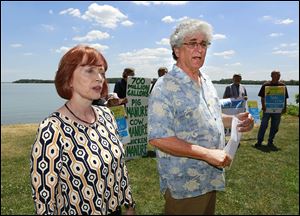
ENVIRONMENTAL LAW AND POLICY CENTER
2nd Lake Erie impairment suit in district court
2 local advocates join in filing
5/18/2017A second lawsuit that aims to get the Ohio waters of western Lake Erie designated as federally impaired was filed Wednesday in U.S. District Court, the main difference being that the newest suit seeks to get the debate heard in a Toledo courtroom.

Susan Matz, left, and Mike Ferner of Advocates for a Clean Lake Erie have joined the Chicago-based Environmental Law and Policy Center in a court filing about the status of Lake Erie.
The Chicago-based Environmental Law and Policy Center said it filed its suit in the Northern District of Ohio in hopes it will be heard by Senior Judge James G. Carr of Toledo.
Joining the policy center in that suit are former Toledo councilman and mayoral candidate Mike Ferner and Susan Matz, both of Advocates for a Clean Lake Erie, who have become policy center members, said Howard Learner, president and executive director of the policy center.
Much like litigation filed April 25 in U.S. District Court in Washington, the latest filing stems from Ohio Gov. John Kasich’s refusal to join Michigan in declaring the open waters of western Lake Erie as impaired under the federal Clean Water Act.
Such a designation is highly controversial because it would set up the western Lake Erie region for more intensive research into the specific causes of the lake’s chronic algae problem, as well as regulations more specifically tailored to farms and other businesses letting algae-growing nutrients get into the water. Environmental groups insist the designation is necessary for sufficient restoration, while industry groups fear it would hurt a region’s image and branding.
The first lawsuit was filed by Alliance for the Great Lakes, the Lake Erie Charter Boat Association, the Lake Erie Foundation, the Michigan United Conservation Clubs, the National Wildlife Federation, and the Ohio Environmental Council.
Both lawsuits take aim at the U.S. Environmental Protection Agency and its administrator, Scott Pruitt, and acting U.S. EPA Region 5 chief Robert Kaplan, asserting the agency failed to meet its obligation to rule on Ohio’s latest proposal for state-controlled impaired waters. Ohio filed its report Oct. 20 and the agency — by law — had to render its decision on whether to accept or reject it within 30 days. It has done neither.
“The U.S. EPA is not allowed to sit on its hands,” according to Mr. Learner, who described the ELPC-ACLE lawsuit against the agency as “a parallel action” to what was filed by the other groups.
He said the courts may end up consolidating the cases, but said ELPC and ACLE believe it’s important to have the case heard in Toledo to have it “closer to the action.”
The U.S. EPA has declined comment, citing its policy against issuing statements about pending litigation.
Judge Carr has presided over several major environmental cases involving Lake Erie, including years of litigation on Ottawa River restoration efforts and the city of Toledo’s consent order with the U.S. EPA over sewage overflows.
“ELPC filed a lawsuit in a district court in Toledo because this is the city where 500,000 lost their drinking water for 72 hours in 2014,” Madeline Fleisher, ELPC staff attorney in Columbus, said. “We also believe Ohio EPA is passing the buck by choosing to call only portions of Lake Erie impaired instead of the full open waters in the western basin. The first step to reducing toxic algae blooms in Lake Erie is to call attention to it with an impairment designation, then devise enforceable standards to make the water clean and safe.”
Michigan declared its much smaller portion of western Lake Erie impaired in 2016.
Contact Tom Henry at: thenry@theblade.com, 419-724-6079, or via Twitter @ecowriterohio.